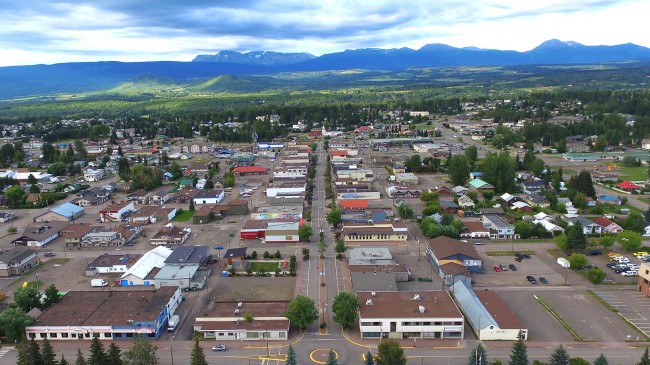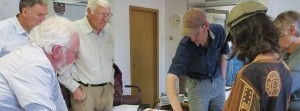
Photo Credit: Daniel Mesec
The Economic Expanse
As the sun begins to fade on a chilly afternoon in Terrace, the regular crowd shuffles in to Sherwood Mountain Brewery for a post-work pint. The brewery has become the spot for drink and dialogue about all things. Today the topic of discussion hovers around jobs and the economy, which after years of boom and bust, seems to be back on the upswing.
I take a seat on the patio at the end of a long cedar table next to three young men and begin to ask them how they’re feeling about the current state of the local economy. At first the conversation is pretty positive: everyone is working, an epic ski season has just come to an end, and people can hardly wait for the spring weather to arrive. But there is clearly tension when the discussion shifts to the possibility of another major industrial boom.
Historically, the massive expanse of northwest BC has been a hub for resource extraction projects, mainly forestry and mining. More recently the north coast has been eyed by LNG producers who want to pipe fracked gas from wells in the Northeast to export terminals in Kitimat and Prince Rupert. It’s a contentious issue for many, and it doesn’t take long for the topic to come up.
“The natural gas industry up here is pretty crazy about all the projects they’re trying to pass through,” says Andy Leighton, a second year nursing student at the University of Northern British Columbia’s Terrace campus.
“I think it’s important to protect industry to a certain extent, but we also need to transition towards more renewable resources, especially when markets aren’t necessarily going to stay,” he adds.
My discussion with Leighton and others on the brewery patio is part of a listening tour I’ve been doing over the past couple months in collaboration with The Discourse, a journalism company based in Vancouver. I’m trying to get a sense of what locals think about the economy in the Northwest—the concerns they have and the opportunities they see emerging.
As the conversation deepens, a heated debate between two patrons breaks out; it’s clear the issue of LNG is a polarizing one. Leighton and his friends don’t see exporting gas as a viable option for the Northwest. They say it’s too environmentally risky. But others at the table don’t agree and argue that if LNG projects do move ahead, the region would benefit through direct and indirect job prospects, as well as through revenue invested back into the regional economy.
Despite their opposing views, everyone remains friendly and all seem to agree on one thing: there are plenty of jobs to be had right now.
“I don’t know anyone that is looking for a job and can’t find one,” Leighton says. “All my friends that are looking for jobs find one pretty quickly. They just have to work outside of their regular work environment.”
This is a notion that seems to be coming up again and again, that the best way to build a diverse local economy is to diversify your skills so you can adapt to a fluctuating labour market.
“I would still define the Northwest as a resource-heavy and resource-rich economy,” says Liliana Dragowska, a community planning consultant based in Smithers. “But there’s this other element of a creative economy that’s not so focused on big dollars, but drives so many individuals to keep the lifestyle they want and keep living in these communities.”
When Dragowska was planning a move to BC, she says it was a toss up between Victoria and Smithers. Although the opportunities for higher wages were more plentiful in Victoria, the draw to a northern lifestyle was more appealing and pushed her to find creative ways to make a living.
“Our resource economy is still strong and there’s opportunity for sustainable and reasonable growth, so that’s good as a stability marker, but what gives me hope is there are still so many ideas that haven’t come to fruition.”
Smithers seems to be a special case. Although the town of around 5,000 hasn’t seen significant growth in almost 50 years, it has done a reasonable job at diversifying its economy. Main Street is full of boutiques and coffee houses; West Fraser operates a sawmill that employs around 200 people; it’s a hub for government and health services; and the community is right in the heart of steelhead-fishing paradise.
All of this—and more—contributes to a diversified community. According to the 2016 census, employment in Smithers is spread over multiple industries, giving the town a better chance at weathering the storm in an economic downturn. In the Bulkley Valley, the current economic outlook is positive and several industrial and infrastructure projects are on the go or in the works. But the strength of the local economy continues to be rooted in innovation and entrepreneurship. If the Northwest is to remain a prosperous region, we have to work together. For Allan Stroet, the former Bulkley Valley Economic Development officer, that means supporting each other in all our economic endeavours.
“The economy in northwest BC can’t be defined by one thing, but it’s also defined by everything,” Stroet says. “It’s cultures and subcultures, but it always boils down to the people. We’re forced to stick together.”
— Daniel Mesec
Daniel Mesec is currently a Local News Fellow with The Discourse. During the coming weeks and months, he will be visiting several other communities in the Northwest in the hopes of speaking to as many people as possible about what they think of the economy and what stories are missing from current news coverage.
How do we ensure economic strength and diversity throughout all northern communities, across all economic sectors? What kind of economic development do you want to see in your community? For updates, questions, or ideas to help Dan with his reporting, connect on Facebook or email him at danielmesec@gmail.com.



